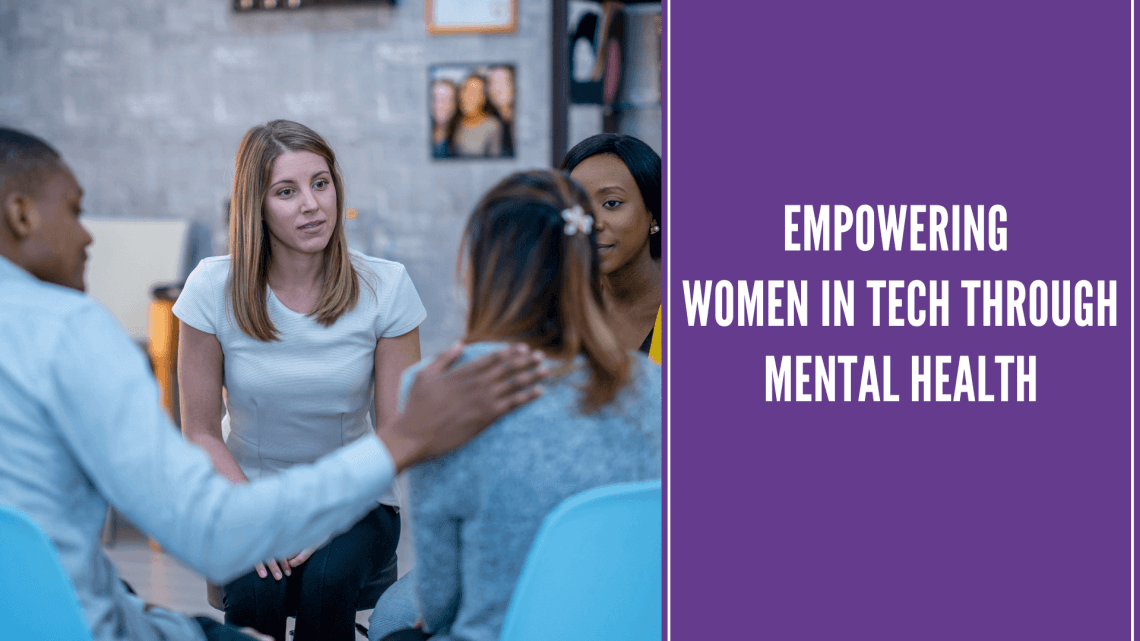
Breaking down barriers and championing equality in the tech industry requires more than just professional development and skills training. It demands a holistic approach that recognizes the crucial role of mental health in empowering women in tech. From tackling imposter syndrome to combating burnout, prioritizing mental well-being is the key to unlocking the full potential of women in this dynamic field.
But what do you need to take mental health into your hands?
We recently interviewed several successful tech and mental health professionals in order to gain valuable insights that can benefit women in tech and help them seek solutions for improving their emotional health.
Our conversations centered around three main themes: the significance of finding commonality and connection, the importance of recovery strategies during stress, and the changes women in tech have implemented that positively impacted their mental health.
Listed below are 3 primary questions we've asked them to glean more information from their personal and professional experience:
What is the importance of finding commonality and connection?
Finding commonality and connection plays a crucial role in fostering understanding, empathy, and cooperation among individuals, especially for women in tech who often confront bias of all sorts. Communities allow us to transcend differences and build bridges, creating a sense of unity that is vital for social cohesion, collaboration, and the pursuit of common goals.
Alex Basche is a psychotherapist (LMFT) based in the SF Bay Area. Alex specializes in the treatment of digital abuse and addictions (such as gaming, social media, etc.) in teenagers and young adults, as well as frequently co-occurring conditions such as anxiety disorders, ADHD, depressive disorders, OCD, Autism Spectrum, and identity formation issues. His private practice operates both virtually and in Menlo Park.
Holly Duckworth, CMP, CAE, CWMF has been called the trailblazer of mindfulness for leaders. Owner of Leadership Solutions International, for 20+ years she has worked to change how we think about the impacts of stress and meetings. As a certified workplace mindfulness facilitator, she leads the global mindfulness efforts for the meetings industry. She is the founder of the American Mindfulness Association to advance mindfulness as a key strategic business practice.
Noel Buck Liotta, a Partner Ecosystem Manager at Qualtrics, shares that: “Going from full-time in-person work to full-time remote work was great for my work-life balance and my ability to focus throughout the day - but the most challenging thing has been finding social connections in and out of my team. It’s been pretty tough for me to reach out to my fellow remote colleagues for non-work conversations - but sharing those moments of connection when I've been able to have been so fulfilling. Being able to connect with someone about life outside of work was really refreshing - and we were even able to talk through some of our current work challenges and find support in each other.”
In moments of stress or frustration, what helps one to recover and return to the best version of oneself according to you?
Alex Basche: I remind myself that 'this too shall pass' and consider how grateful I am for those in my life I care for the most. I take 10 deep, cleansing breaths in through the nose and out through the mouth, allowing my belly to steadily fill with air and then shrink back down. Lastly, I'll try to curiously explore what the situation is inside vs outside my control, and how much of it truly is meaningful to me.
Holly Duckworth:"Life happens, and when it does breathing is the single key to returning to the center of your knowing. Your heart always knows how to beat. You don't have to tell it to beat, beat, beat. Return to breath, return to center and you will find there the best version of yourself in every moment."
Sandrine Y., a Senior Learning Experience Designer at Qualtrics, also shares what has helped her: “Three deep breaths. Turning off the noise of the internet and listening to the sounds of nature. Additionally, if my moment of stress or frustration is due to a mistake I’ve made, reevaluating that and discovering what the lesson to be learned is is incredibly empowering.”
What changes have you seen women in tech make in their lives that had a significant positive impact on their mental wellness?
Holly Duckworth: "Most people are surprised to realize that significant positive impacts may not come from big things, they come from the little things repeated over and over. My clients often comment on the power of self-talk having a significant impact on their mental wellness and the outcomes in their lives. When a client moves from, I can't do that to I may try it can literally change the trajectory of their lives."
Alex Basche:"I've seen truly remarkable growth in many forms, but it often comes back to people taking full ownership of what & where they are now and then real action towards how & who they want to be."
Morgan Groendyke, Product Manager at Qualtrics: “I started reminding myself of the positive impact I do have. When I am stressed or overwhelmed at work, I talk to those I have mentored or take a few minutes to work on something that I know brings value to my team. I take some time to be quiet and productive, like working in my garden or playing with my dog. A lot of angry or anxious reactions are caused by a lack of time to pause and think, so I have built that time to pause into my reaction, which has helped increase mental wellness.”
Thinking of the Bigger Picture
Mental health is crucial for women in tech as it directly impacts their well-being, productivity, and overall success in the industry. By prioritizing their mental health, women can effectively cope with the biases, discrimination, and high-pressure environment they may face. Taking care of their mental well-being empowers women in tech to thrive, contribute their unique perspectives, and break barriers within the industry.







